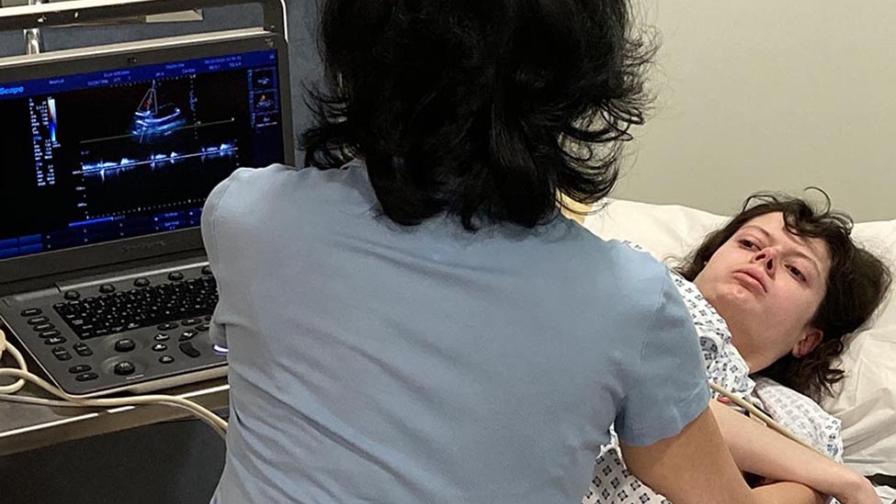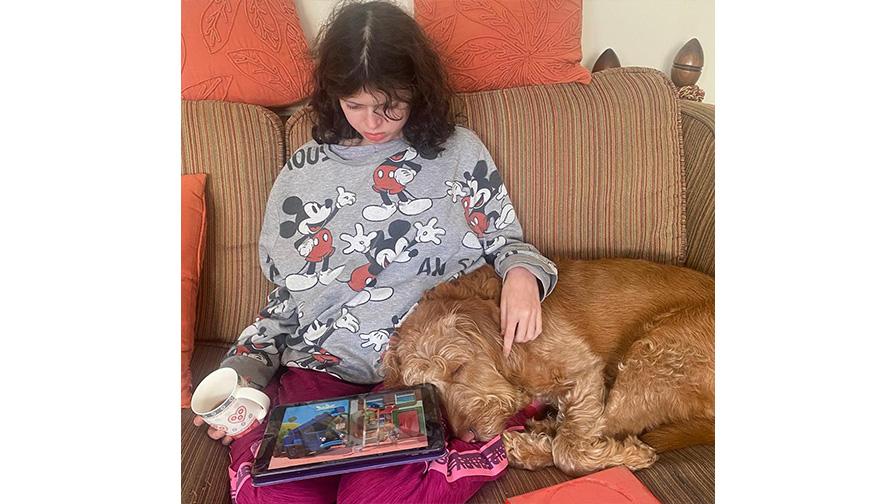One-stop clinic offers cardiology alongside neurology
New model of integrated care spells hope for the future
A unique one-stop clinic for people with Dravet syndrome has been launched at the Epilepsy Society’s Chalfont Centre.
The service, thought to be the only one of its kind in the UK, is designed to reduce the number of clinical appointments a person has to attend, reducing the stress for both the person and their caregiver, and accelerating any treatment changes as required.
The new service is specifically for people who have a severe form of epilepsy, Dravet syndrome, and who are prescribed the medication fenfluramine which requires careful heart monitoring. For the first time, patients will be able to see a cardiologist at their epilepsy clinic without having to make a separate appointment at another hospital.

Ella undergoing an echocardiography test
Integrated care should become gold standard for adults
And Professor Sanjay Sisodiya, Director of Genomics at the Epilepsy Society, hopes that in time, multi-disciplinary clinics for adults will become the gold standard in treating people with complex epilepsy.
“Multi-disciplinary clinics are standard in paediatric care but much more difficult to find in adult care,” he said. “Integrated care should be the future for those with complex care. It is what we should be doing. No-one should have to visit five different clinics – we should be able to offer holistic care in clinics that provide a range of disciplines including cardiology, psychiatry and speech and language therapy. This service is very much the start of things to come.”
The new service means that adults with Dravet syndrome who are prescribed fenfluramine will be offered on-site echocardiography, undertaken and reviewed by a cardiologist at the Chalfont Centre during their regular epilepsy appointment.
Monitoring is carried out before treatment begins and every six months for two years, then yearly. If heart problems are detected, the medication may have to be stopped but regular heart checks will continue.
Ella is first person to benefit
Ella Hitchen from Redditch is the first person to benefit from the new service. Ella, 27, was diagnosed with Dravet syndrome in early infancy and her life has been dominated by seizures. When Ella was first prescribed fenfluramine, it meant she also had to travel to a separate hospital for an echocardiogram to monitor her heart.
Her mum, Tara Hitchen said: “Previously we had to go to a different hospital for the echocardiogram. That could be quite stressful for Ella as it meant more car journeys, waiting rooms and tests. Quite often the hospital wouldn’t know who had requested the test and we would have to then wait for results from the GP. The echocardiogram would often be carried out in very small rooms where there wasn’t enough room for both myself and Ella’s carer, Jackie.
“At the Chalfont Centre we can see Ella’s doctor and then have the echocardiogram in the room next door where there is plenty of space. It is much more relaxing for everyone but particularly for Ella.”
Find out how Ella and her dog have become new best friends since the treatment

Ella and her dog
Importance of minimising stress
Dr Lisa Clayton who is running the service said: “As new antiseizure medications become available, it is important that we are able to offer these in a way that is safe whilst minimising the impact that it has on people with epilepsy and their caregivers.
"Fenfluramine treatment requires regular echocardiogram monitoring, so being able to do this during their regular epilepsy clinic appointment reduces the number of hospital visits and, importantly, reduces stress for the person with epilepsy and their caregivers.
"We believe this is the only service of its kind for adults with Dravet syndrome in the UK.”
